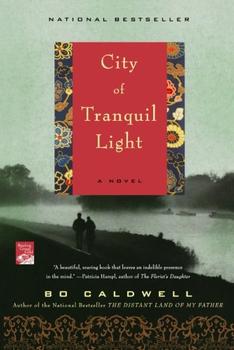Summary | Excerpt | Reading Guide | Reviews | Beyond the Book | Readalikes | Genres & Themes | Author Bio

A Novel
by Bo CaldwellShepherd-Teacher
Suppose it is an autumn day, fine and clear and cool. Late afternoon, when the sun nears the horizon and turns the sky into a watercolor of pastels. It is beautiful, as though God is showing off. As you approach the city you first see its wall, an immense gray brick structure that is as solid as it is imposing, nearly as wide as it is high, some thirty feet. If you are coming from the east, it will be in sharp silhouette against the lovely changing sky. Near the city the air begins to smell of smoke, but mostly it has the sweet, clean scent of the ripening winter wheat in the surrounding fields.
From a distance the city may not look like much; only that dark wall is visible, and what can that tell you? Some say the cities in the North China Plain are by and large alike, one indistinguishable from another; to them this one might look like any other. But it is not; I can testify to this, for it is the place on this earth that I love the most, the city in which my wife and I lived for nearly twenty-five years among beggars and bandits and farmers and scholars and peasants, people whom we deeply loved. The name of the city is Kuang P'ing Ch'eng - City of Tranquil Light - and although I now reside in southern California and have for many years, that faraway place remains my home.
And it is often in my thoughts. Above my bed hang three Chinese scrolls depicting New Testament scenes, painted by our most improbable convert and given to me when we left China. In the first, the prodigal son kneels at his father's feet as the father rests his hands on the young man's head. The son's pigtail is disheveled and his blue peasant's tunic and trousers are dirty and torn, while the father's violet silk robe is immaculate. In the second, an oriental woman lovingly washes our Lord's feet with her tears and dries them with her long black hair, her own bound feet tucked beneath her, and in the third, a slight but sturdy Zacchaeus, wearing a gray scholar's robe and with his long braided queue hanging down his back, climbs a persimmon tree for a glimpse of Yeh-Su, Jesus. A Chinese lantern of bright red silk - red is the color of happiness - hangs over my writing table, and a small carved chest made of camphor wood holds my woolen sweaters. My Chinese New Testament, its spine soft and its pages worn, sits on the table by my reading chair, with a strip of faded red paper, a calling card given to me long ago, marking my place. I still read the Scriptures in Chinese; I find I am more at home in it than I am in English, just as my Chinese name, Kung P'ei Te, given to me at the beginning of this century, seems more a part of me than my legal name, Will Kiehn.
On my dresser is the photograph taken on our wedding day, November 4, 1908. Katherine and I were married at the American Consulate in Shanghai, and we are wearing Chinese clothes in the picture; our western clothes were too shabby for the occasion, and by then we had dressed in Chinese clothes for two years. Next to the photograph is my wife's diary, a thin volume I never read while she was alive but whose pages I now know by heart. Reading her sporadic entries is bittersweet, for while they bring our years together to life, they also show me my flaws and the ways in which I hurt her, unintentional though they were. But her pages make it seem that she is near, and if the price I pay for that closeness is regret it is a bargain still, albeit a painful one. I was her husband for over thirty-seven years, during which the longest we were apart was thirty-one days. She taught me the self-discipline I lacked, believed I was capable of far more than I did, and loved me as a young man as well as an old one. She was the one and only love of my life.
When I was twenty-one and on my way to China, I tried to envision my life there. I saw myself preaching to huge gatherings of people, baptizing eager new converts, working with my brothers in Christ to improve their lives. I did not foresee the hardships and dangers that lay ahead: the loss of one so precious, the slow and painful deprivation of drought and famine, the continual peril of violence, the devastation of war, the threat to my own dear wife. Again and again we were saved by the people we had come to help and carried through by the Lord we had come to serve. I am amazed at His faithfulness; even now our lives there fill me with awe.
Excerpted from City of Tranquil Light by Bo Caldwell. Copyright © 2010 by Bo Caldwell. Excerpted by permission of Henry Holt and Company. All rights reserved. No part of this excerpt may be reproduced or reprinted without permission in writing from the publisher.
Your guide toexceptional books
BookBrowse seeks out and recommends the best in contemporary fiction and nonfiction—books that not only engage and entertain but also deepen our understanding of ourselves and the world around us.